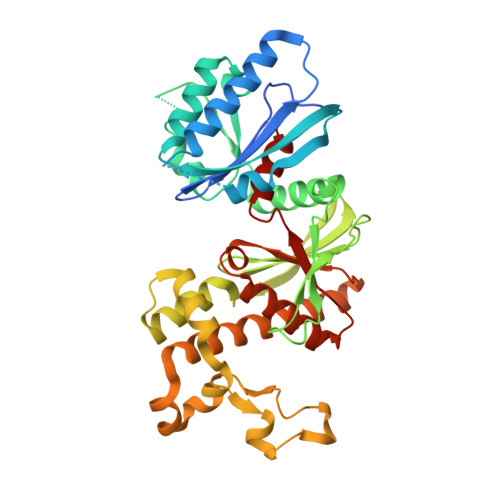Modulation of Pantothenate Kinase 3 Activity by Small Molecules that Interact with the Substrate/Allosteric Regulatory Domain.
Leonardi, R., Zhang, Y.M., Yun, M.K., Zhou, R., Zeng, F.Y., Lin, W., Cui, J., Chen, T., Rock, C.O., White, S.W., Jackowski, S.(2010) Chem Biol 17: 892-902
- PubMed: 20797618
- DOI: https://doi.org/10.1016/j.chembiol.2010.06.006
- Primary Citation of Related Structures:
3MK6 - PubMed Abstract:
Pantothenate kinase (PanK) catalyzes the rate-controlling step in coenzyme A (CoA) biosynthesis. PanK3 is stringently regulated by acetyl-CoA and uses an ordered kinetic mechanism with ATP as the leading substrate. Biochemical analysis of site-directed mutants indicates that pantothenate binds in a tunnel adjacent to the active site that is occupied by the pantothenate moiety of the acetyl-CoA regulator in the PanK3acetyl-CoA binary complex. A high-throughput screen for PanK3 inhibitors and activators was applied to a bioactive compound library. Thiazolidinediones, sulfonylureas and steroids were inhibitors, and fatty acyl-amides and tamoxifen were activators. The PanK3 activators and inhibitors either stimulated or repressed CoA biosynthesis in HepG2/C3A cells. The flexible allosteric acetyl-CoA regulatory domain of PanK3 also binds the substrates, pantothenate and pantetheine, and small molecule inhibitors and activators to modulate PanK3 activity.
- Department of Infectious Diseases, St Jude Children's Research Hospital, 262 Danny Thomas Place, Memphis, TN 38105, USA.
Organizational Affiliation:


















